Hyundai i10 vs Toyota Yaris Cross - Differences and prices compared
Compare performance (90 HP vs 130 HP), boot space and price (14600 £ vs 23700 £ ) at a glance. Find out which car is the better choice for you – Hyundai i10 or Toyota Yaris Cross?
Costs and Efficiency:
Price and efficiency are key factors when choosing a car – and this is often where the real differences emerge.
Hyundai i10 has a decisively advantage in terms of price – it starts at 14600 £ , while the Toyota Yaris Cross costs 23700 £ . That’s a price difference of around 9129 £.
Fuel consumption also shows a difference: Toyota Yaris Cross manages with 4.50 L and is therefore hardly perceptible more efficient than the Hyundai i10 with 4.90 L. The difference is about 0.40 L per 100 km.
Engine and Performance:
Under the bonnet, it becomes clear which model is tuned for sportiness and which one takes the lead when you hit the accelerator.
When it comes to engine power, the Toyota Yaris Cross has a clearly perceptible edge – offering 130 HP compared to 90 HP. That’s roughly 40 HP more horsepower.
In acceleration from 0 to 100 km/h, the Toyota Yaris Cross is hardly perceptible quicker – completing the sprint in 10.70 s, while the Hyundai i10 takes 11.40 s. That’s about 0.70 s faster.
In terms of top speed, the Hyundai i10 performs minimal better – reaching 175 km/h, while the Toyota Yaris Cross tops out at 170 km/h. The difference is around 5 km/h.
Space and Everyday Use:
Whether family car or daily driver – which one offers more room, flexibility and comfort?
Both vehicles offer seating for 5 people.
In curb weight, Hyundai i10 is somewhat lighter – 996 kg compared to 1180 kg. The difference is around 184 kg.
In terms of boot space, the Toyota Yaris Cross offers evident more room – 397 L compared to 252 L. That’s a difference of about 145 L.
In maximum load capacity, the Toyota Yaris Cross performs slight better – up to 1097 L, which is about 47 L more than the Hyundai i10.
When it comes to payload, Toyota Yaris Cross to a small extent takes the win – 510 kg compared to 423 kg. That’s a difference of about 87 kg.
Who wins the race?
The Toyota Yaris Cross proves to be leads convincingly overall and therefore becomes our DriveDuel Champion!
Toyota Yaris Cross is the better all-rounder in this comparison.

Toyota Yaris Cross
Costs and Consumption
View detailed analysis
Engine and Performance
View detailed analysis
Dimensions and Body
View detailed analysis
Hyundai i10
The Hyundai i10 is a cheeky city car that squeezes big-car confidence into a pocket-friendly package, carving through tight streets with surprising composure and sensible practicality. For buyers after low fuss, sensible equipment and wallet-friendly running costs, it's a smart, no-nonsense pick that makes sense whether you're a first-time driver or need a reliable second car.
details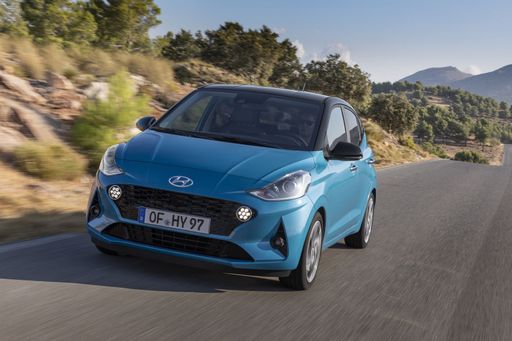
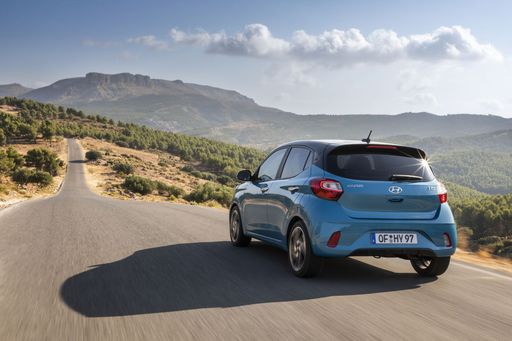
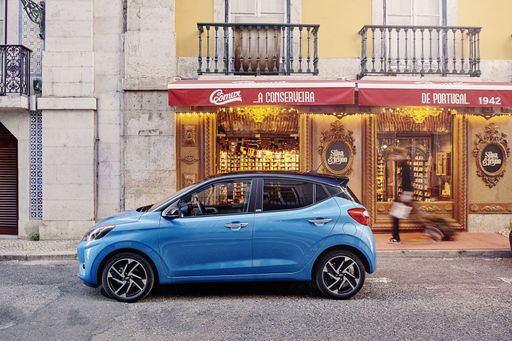
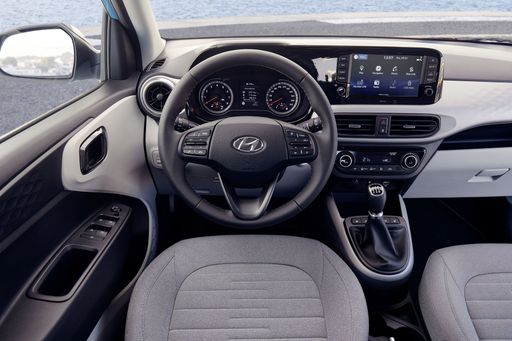
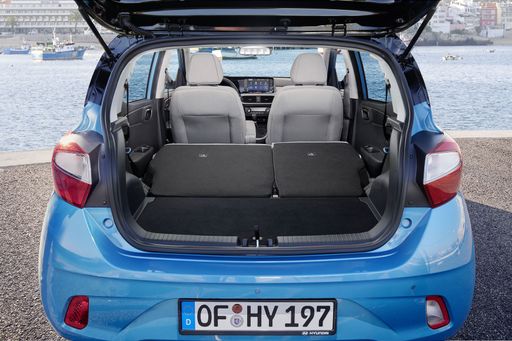
Toyota Yaris Cross
The Toyota Yaris Cross takes the jaunty personality of the Yaris and gives it a taller stance and a bit more practicality, so you get city-friendly agility with added SUV presence. It’s easy to live with, economical on the daily grind, and smartly packaged — a sensible pick for buyers who want fuss-free transport with a touch of character.
details






Costs and Consumption |
|
|---|---|
|
Price
14600 - 19000 £
|
Price
23700 - 34300 £
|
|
Consumption L/100km
4.9 - 5.5 L
|
Consumption L/100km
4.5 - 4.8 L
|
|
Consumption kWh/100km
-
|
Consumption kWh/100km
-
|
|
Electric Range
-
|
Electric Range
-
|
|
Battery Capacity
-
|
Battery Capacity
-
|
|
co2
110 - 124 g/km
|
co2
101 - 108 g/km
|
|
Fuel tank capacity
36 L
|
Fuel tank capacity
36 L
|
Dimensions and Body |
|
|---|---|
|
Body Type
Hatchback
|
Body Type
SUV
|
|
Seats
4 - 5
|
Seats
5
|
|
Doors
5
|
Doors
5
|
|
Curb weight
996 - 1099 kg
|
Curb weight
1180 - 1290 kg
|
|
Trunk capacity
252 L
|
Trunk capacity
320 - 397 L
|
|
Length
3670 - 3675 mm
|
Length
4180 mm
|
|
Width
1680 mm
|
Width
1765 mm
|
|
Height
1480 - 1483 mm
|
Height
1595 mm
|
|
Max trunk capacity
1050 L
|
Max trunk capacity
1097 L
|
|
Payload
344 - 423 kg
|
Payload
485 - 510 kg
|
Engine and Performance |
|
|---|---|
|
Engine Type
Petrol
|
Engine Type
Full Hybrid
|
|
Transmission
Manuel, Automatic
|
Transmission
Automatic
|
|
Transmission Detail
Manual Gearbox, Automated Manual
|
Transmission Detail
CVT
|
|
Drive Type
Front-Wheel Drive
|
Drive Type
Front-Wheel Drive, All-Wheel Drive
|
|
Power HP
63 - 90 HP
|
Power HP
116 - 130 HP
|
|
Acceleration 0-100km/h
11.4 - 18.4 s
|
Acceleration 0-100km/h
10.7 - 11.3 s
|
|
Max Speed
143 - 175 km/h
|
Max Speed
170 km/h
|
|
Torque
93 - 172 Nm
|
Torque
-
|
|
Number of Cylinders
3 - 4
|
Number of Cylinders
3
|
|
Power kW
46 - 66 kW
|
Power kW
85 - 96 kW
|
|
Engine capacity
998 - 1197 cm3
|
Engine capacity
1490 cm3
|
General |
|
|---|---|
|
Model Year
2024
|
Model Year
2024 - 2025
|
|
CO2 Efficiency Class
C, D
|
CO2 Efficiency Class
C
|
|
Brand
Hyundai
|
Brand
Toyota
|
Is the Hyundai i10 offered with different drivetrains?
The Hyundai i10 is offered with Front-Wheel Drive.




